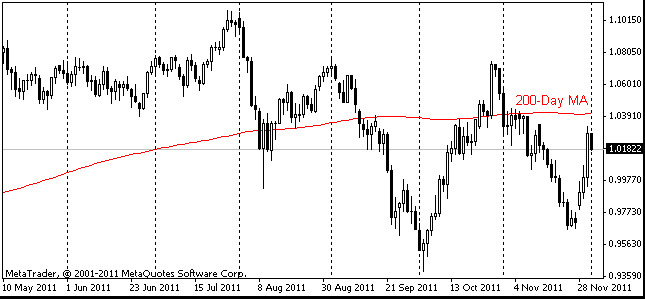EUR/usd
euro-bulls are consolidating their forces to close the week above 1.30. And there is some reason to believe that they will succeed. However this is unlikely to change the situation much. This week's sales of the single currency are regarded as the biggest for the last three months; they have brought the euro to its lowest level since the beginning of the year. After a powerful move from 1.3380 to 1.2950 market participants need time to take a breath. Bargain hunters appeared in the market a day earlier than expected. Yesterday the euro managed to get over 1.30 and is now trading at 1.3040. This can be defined as a consolidation of forces before a new strike to get over the preceding lows rather than a correction. A new wave of sales may overtake the markets next week, but this week we will hardly see any significant shifts in either direction. Thursday's flood of statistics brought only a relative relief. Flash Euro-Zone PMI data proved to be better than expected, but still the indices of services and production remain below 50, marking a worse situation in comparison with the previous month. Friday will bring us less statistics, but there will be many speeches of European and American policymakers, who in fact are unlikely to say something new. Some commentators have already begun to use the word “depression” to describe the current economic situation. Earlier this week Krugman mentioned this word in his blog. Yesterday IMF Director Lagarde was just a step away from using it: speaking about the threats the world is facing now, she enumerated «economic retraction, rising protectionism, isolation and. . . what happened in the 30s ».

GBP/USD
Statistics on British retail sales turned out to be a bit weaker than expected. Retail sales excluding fuel costs fell by 0.7% in November against the expected -0.4%. But here we should consider a significant upward revision of the preceding data. This allowed the annual statistics to show an increase and to exceed expectations. Yesterday's survey of the BoE showed that the inflation expectations in the region make 4.1% against 4.2% a quarter before. That would be close to the truth, if people had been asked about their expectations of the annual CPI growth in the coming quarter. But the question was about the expected level of inflation in the coming 12 months. It makes a striking dissonance to what was forecasted by the Bank of England in its November Inflation report: a 1.5-2.0%decrease of the CPI growth by the end of the next year. Note that both surveys were held at the same time – the beginning of November. In Forex the sterling has come back to the area above 1.55 on the correction of stock markets and after the euro bounced up above 1.30. Apparently, the pound will close this week above 1.55, if no bad news comes out.

USD/JPY
The mood of correction has passed on to the yen too. Like all other assets the Japanese currency has made for the levels of the first part of the week. However, in case with the yen the growth achieved since the beginning of the week has been reduced almost to nothing. The pair has returned to the 77.90 area while at the start of the week it was at 77.65. Yet this does not change our bullish outlook about the prospects of the currency. As stated above, we tend to interpret the current movement in Forex as consolidation rather than the beginning of a reversal.

AUD/USD
The Australian dollar got support on the rebound of stock markets. Once again it flirted with parity. Now it is trading near 0.9960, but in case of a positive scenario of the day, it may even try to break above 1.00. The Australian economy is strong, but the exchange rate at present and in the foreseeable future will be greatly affected by external factors. This dependence on the strength of China, the USA and the situation in the euro area doesn't allow the currency to demonstrate its potential to the full. To be dependent on the global economic cycles is the fate of any economy exporting raw materials.
